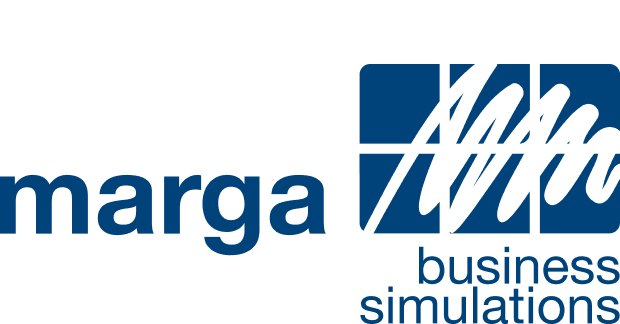Gamification in adult education: How business games can help to increase motivation in the learning process
Find out how gamification can lead to a significantly more effective learning process and offer great added value, especially in the context of online training.

Gamification in adult education:
How business games can help to increase motivation in the learning process

Especially in online learning, gamification can avoid lack of motivation and self-discipline.
How is gamification used in business games?
In business games, participants take over the management of a virtual company and compete as a team with other teams. Over several game periods, they develop strategies and make decisions. The effects of the decisions can be viewed and analysed after each game period. In this way, the participants develop a feeling for the interaction of the various corporate divisions and functions in a playful manner. Accordingly, business simulations are games that have an added value that goes beyond the gaming experience: the imparting of business content and management know-how. They are therefore not primarily for entertainment, but for learning and repeated training of what has been learned. In this context, we also speak of so-called serious games.
Gamification is used in business games to support interactive and motivated learning in a competition. The gamified elements create a positive learning environment, which makes learners more open to the content and at the same time more focused and interested in contents. As board members of their own company, the players are emotionally involved and experience a wide range of emotions during the game, which can consist not only of joy and pride but also of disappointment and frustration. That is important because it means that even a supposed failure can be turned into a learning experience, that can be used for the subsequent business game period.

Trying things out together in a team helps to develop a deep understanding of the learning contents.
The use of game-typical features in the MARGA business game
Gamification makes use of game-typical elements, which are also applied as central success factors in MARGA. By trying things out together in a team – in other words, learning by doing – participants develop not only a profound understanding of the processes in their company, but also business decision-making skills that strengthen their confidence in their own abilities. Through the targeted and repeated application of newly acquired knowledge in the game, contents are consolidated and remain in memory in the long term. In addition, working on the tasks within a team strengthens the collective experience and thus the team spirit as well as interactivity. This type of group work is a typical feature of gaming, as it also depends on several players working together to complete a puzzle or task. Social skills are fostered in this setting.
MARGA also works with rankings as a game-typical element, which make it possible to directly compare the own performance with competitors at the end of each game period. The resulting intensified competitive situation has a strong motivational effect and ensures that the players stay in the game and do not back down from more difficult problems and challenges.
Another important game element is direct feedback. When a task or game period is finished, the player expects prompt feedback with a visible score. In the MARGA business game, the results achieved by the own company and the competitor companies are presented after each game period. These can be analysed and, based on this, the own strategy and way of playing can be adjusted. Tutoring by competent MARGA trainers is an important factor for success and supports the players more deeply – especially in the online format – by discussing individual questions and pointing out contexts that relate to their specific decision-making situation.

Working on the tasks within a team strengthens the collective experience and thus the team spirit as well as interactivity.
Gamification as important learning tool
Gamification is more suitable than any other learning tool for motivating people in the learning process. And this is exactly why the MARGA business game makes a difference. The game-based experience of entrepreneurial contexts makes it possible to achieve an effective and sustainable learning process.
“What makes MARGA so unique from our point of view is that the actual learning kind of happens en passant. Our employees were enthused for a rather ‘dull subject’ by means of the business simulation and thereby easily learned the contents. The festive final at the ‘Schloss Gracht’ castle was a great reward for all the effort and commitment.”
Klaus-Dieter Humm, Director Accounting SOKA-BAU



